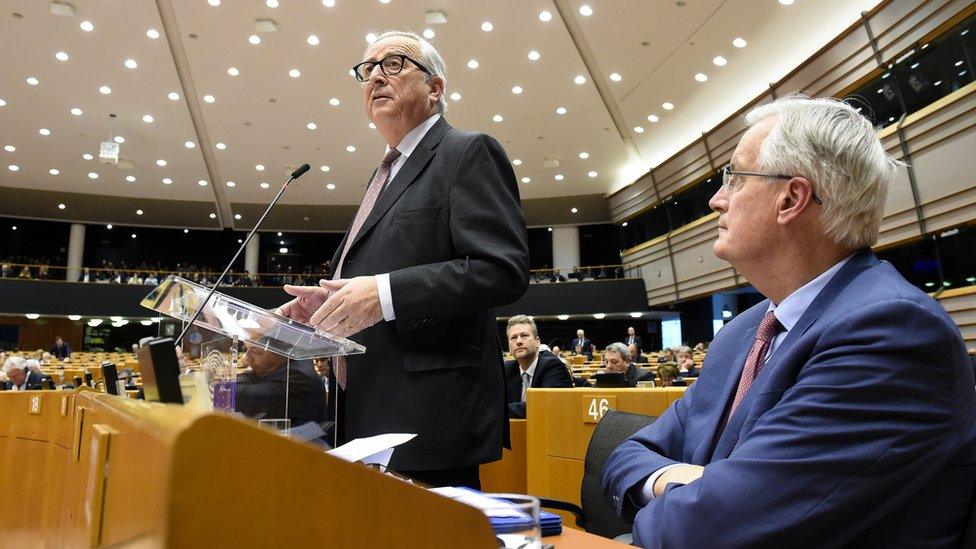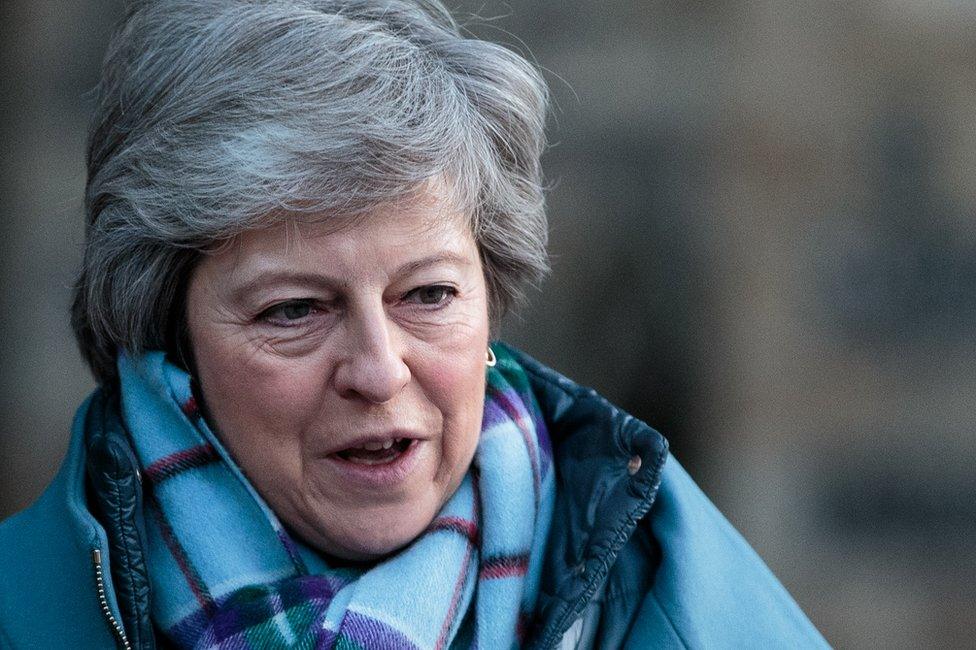Brexit: EU digs heels in over deal
- Published

Not an inch? Top EU officials Jean-Claude Juncker (L) and Michel Barnier in Brussels
So. How open does the EU seem almost a week on from parliament narrowly voting in favour of an amendment to find alternatives to the backstop guarantee to keep the Irish border open after Brexit?
After all, with every passing day as we've heard , again and again and again, the clock is ticking us all towards an increased chance of a no-deal Brexit with all the costs and chaos that could involve.
Well, if I were to speak in weather forecast terms, I might describe current EU attitudes as frosty with a chance of ice.
If Theresa May comes to Brussels later this week, she will be received politely and listened to attentively.
But if her EU ask remains centred around getting a time limit to, or allowing the UK a unilateral get-out mechanism from, the Irish border backstop or if she pushes again for pure technology as a means of avoiding a hard border on the island of Ireland, then the likelihood of her being sent home empty-handed - or as good as - is very high indeed.
This is not because the EU has suddenly become cavalier about the prospect of a no-deal Brexit - far from it. The club may be over the moon about just sealing the world's largest ever bilateral deal with Japan but that's no replacement for trade and cooperation with neighbouring UK.
It's just that the EU sees so many reasons not to budge over the backstop: solidarity with EU club member Ireland over "caving in" to departing member UK; defending the Good Friday Agreement and the Northern Ireland peace process; and above all (in the eyes, hearts and pockets of many EU politicians and businesses) defending the integrity of the EU's single market.
So when Sajid Javid, the UK's home secretary, announced at the weekend that sorting out the backstop would just involve "a bit of good will" on behalf of the EU, I could almost hear the groans of European exasperation from my Brussels living room.
This is something that those in the UK who knowingly repeat that "the EU will give in, in the end" perhaps don't fully appreciate.
Choice of two evils?
The EU certainly does budge at times, even when it has repeatedly ruled out such a move but it performs U-turns out of self-interest, to safeguard the bloc in some way.
Take the oft-cited Greek debt crisis - the EU acted in the interest of the eurozone currency. That is ultimately why it changed its line on member country Greece.
The Brussels calculation is that a no-deal Brexit would be damaging for the EU but exposing the entire EU single market to clear vulnerabilities would be the worst of two evils.
The backstop guarantee for the Irish border ensures a means of sealing the long, meandering, porous border between Northern Ireland and the Republic of Ireland in a way that technology alone (as many Brexiteers are suggesting) cannot.
The EU worries about tariff-dodging and about non-EU standard products being smuggled into the EU's single market "through the back door" - via Northern Ireland and the rest of the UK.
If technology alone could seal a border in terms of customs and regulatory checks then you would no longer see the existing infrastructure in place between close allies and neighbours non-EU Norway and EU member Sweden or between Switzerland, which has very tight relations with the European Union, and its EU neighbours.
So, instead of dramatically changing or weakening the backstop, the EU is more than happy - as officials indicated today to visiting members of the UK's parliamentary Brexit Select Committee - to repeat or re-package its previous reassurances about the backstop.
For example:
That the backstop is a fall-back mechanism, not intended to be used
That all sides would prefer to complete a "deep and ambitious" trade deal that would obviate the need for the backstop
That if such a trade deal were not completed in time, the backstop would not need to be triggered if the transition period (in which the UK legally leaves the EU but remains a member in practical terms while new trade relations are being negotiated) were extended.
An important aside on the transition period: there's a new proposal the EU understands is now being championed by Downing Street - The Malthouse Compromise. Brussels would likely reject this, not only because it seeks to rewrite the backstop but because it suggests paying the EU to extend the transition period even in the case of a no-deal Brexit.
The EU argues (and this is included in the text of the Brexit Withdrawal Agreement) that if the Brexit deal is not passed by the House of Commons, there will be no transition period. Full stop.
Brinkmanship
Now, the EU is not at all convinced that re-hashing assurances about the backstop will be enough to satisfy MPs who voted to change it. They believe the bar set by the DUP and hard-line Brexiteers is too high for any tweaks the EU might be willing to make. Which leaves EU leaders sceptical that Theresa May actually has the majority of MPs behind her.
Just this weekend for example, the EU's deputy chief Brexit negotiator, Sabine Weyand, retweeted a UK commentator pointing out signs of splintering in the brief truce inside the Conservative Party.
Which is why the EU will continue to show ice-cold resolve - at least for now. Hoping, by not giving an inch over the backstop, that the Prime Minister will be forced to look across the political divide, to the Labour Party, for another means to find parliamentary support for the Brexit Deal - such as opting for a permanent customs union with the EU.
This is the EU's hope. But European diplomats see in Theresa May a politician who likes sticking to her Plan A's.

Is the UK Prime Minister simply playing for time?
From the beginning we've discussed the big possibility that with such a divided country, parliament, party and cabinet, the prime minister will simply keep playing for time, inching forward small step by small step until so close to the cliff-edge of having no Brexit deal at all that most MPs will end up backing her and her deal at the very last moment.
This is high-risk brinkmanship.
Dublin is deeply concerned about the consequences of a no deal Brexit - for peace above all but also about the impact on the Irish economy. Taoiseach Leo Varadkar heads to Brussels this Wednesday for high-level meetings. That same day his deputy flies to Washington to lobby for US support to safeguard the Good Friday Agreement and to ensure the Irish border stays open.
Could US disapproval over UK pressure on the backstop makes things more complicated for a future UK-US trade deal?
It won't make things any simpler.